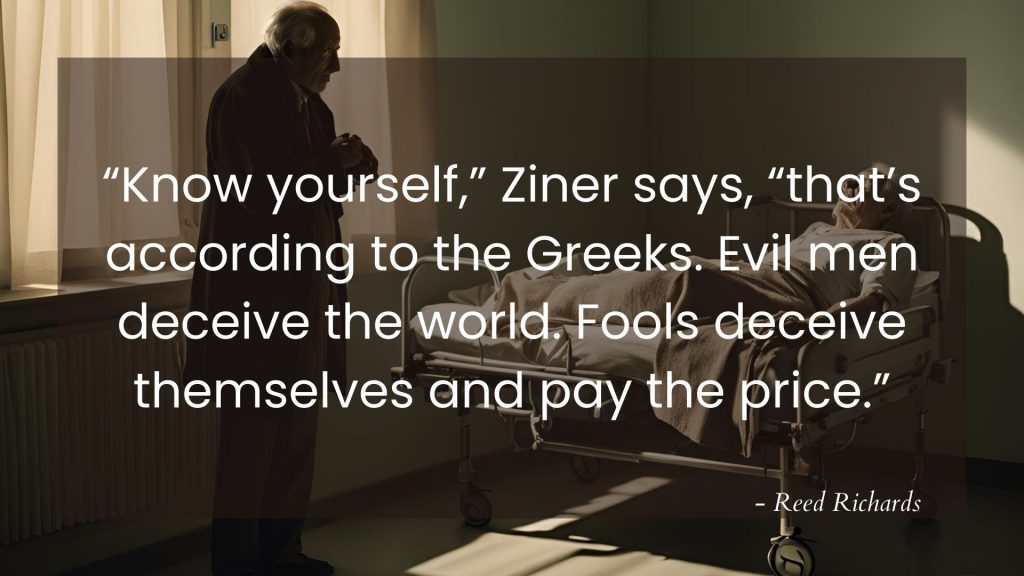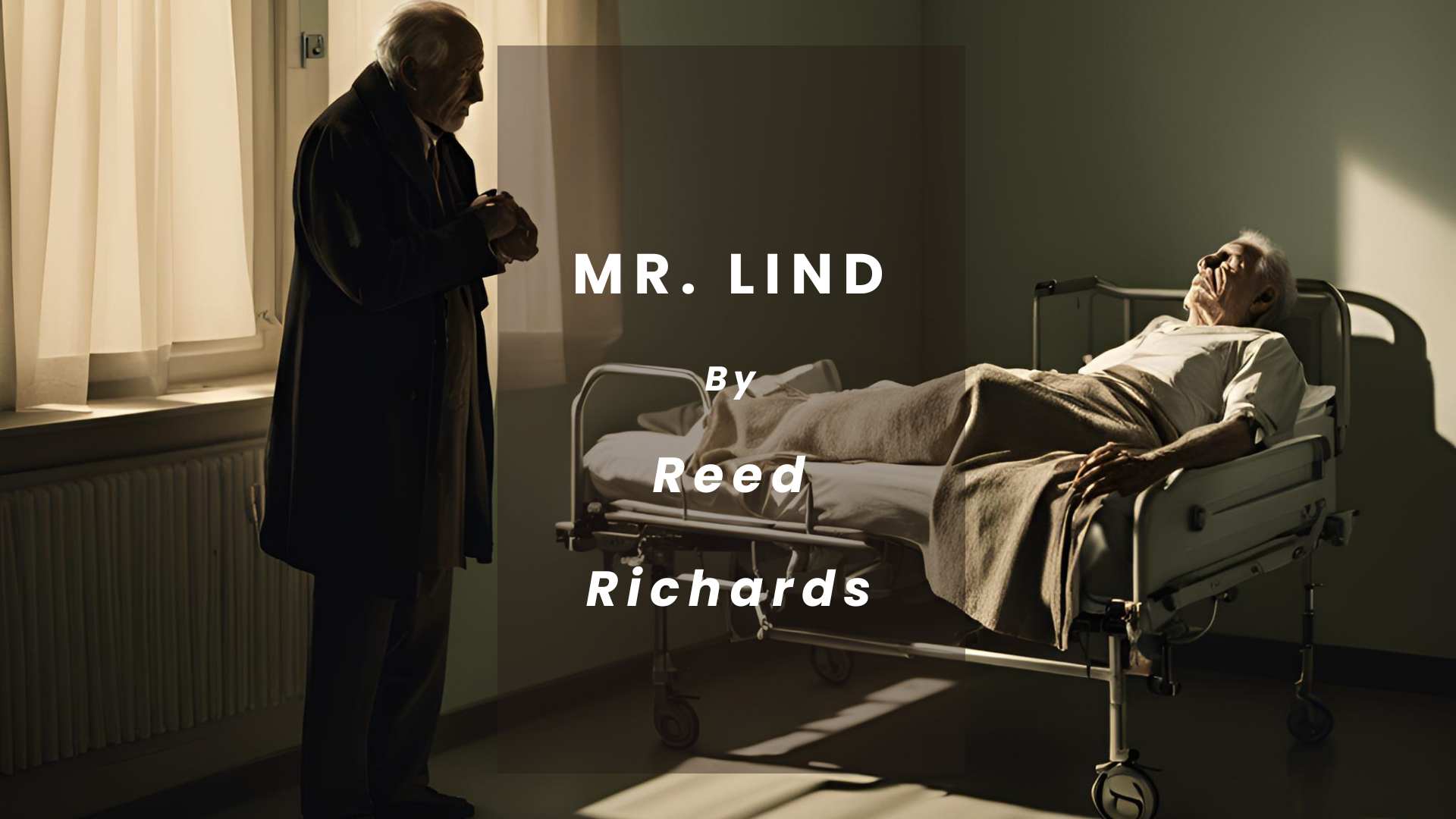Articles/Essays – Volume 57, No. 2
Mr. Lind
Ziner didn’t make Mr. Lind sick, so he’s under no obligation to make him feel better. Whatever small thing he chooses to do is purely out of kindness. Mr. Lind wastes in his tender flesh while Ziner struts in front of his bed to show that the one who can still walk is the one who is not a fool.
For Mr. Lind, wisdom usually ends with a question mark. He knows, for instance, that if a good man can’t forgive his enemies, how can he forgive himself? For going into ministry knowing that God hated the sin he, in the end, would die of. For marrying because his profession in those years demanded it.
“Know yourself,” Ziner says, “that’s according to the Greeks. Evil men deceive the world. Fools deceive themselves and pay the price.”
“Didn’t Jesus say call no man fool?” says Mr. Lind. “Didn’t he say with what judgment ye judge . . . ?”
Ziner says, “Let reason and not your base appetites guide your life.”
“Not love?” Mr. Lind says. “No place for charity? Besides reason there is spirit. Your spirit doesn’t guide you ever?”
Mr. Lind has two passions. The other one is God.
***
Mr. Lind asks Ziner to take the box of video tapes under the bed so that after he dies his sons won’t discover these relics of his appetite. His two sons live out of state. Mr. Lind would like to see them before he dies but knows they will probably wait until he is dead before they decide to come see him.
“Don’t give me trash,” Ziner says. “Those tapes are trash.”
“I wasn’t asking you to watch them,” says Mr. Lind. “Then take the cardinal statuette in the window so I will know where it has gone. I like to think of you having it.”
“That’s trash, too,” Ziner says. “Your taste was always so . . .” He searches for a word. “Disembodied,” Ziner says. “Unconnected,” he says. “Did you ever have a practical thought?”
“I won’t ask you to take the mobile, then,” says Mr. Lind, who is thinking practically. The mobile hangs in front of the bedroom window, above the statuette, a nice accent: the weights are all glass cardinals in flight. On summer afternoons, the sun comes through gaps in the leaves and branches of the hawthorn outside the window and shines through the mobile, making red angels with white sunburst hearts on the opposite wall.
Ziner means not to leave anything when he dies. That day is not far, but he doesn’t know. In life he was a coin dealer, living by the impractical passions of collectors, but never sentimental himself.
“Who sold you this lamp?” Ziner asks. Mr. Lind has always too easily allowed himself to be talked into things. Some of those things involved risk. Let that be the answer to your question. Ziner didn’t make Mr. Lind sick.
***
Mr. Lind lives upstairs in Mrs. Paul’s house. Mrs. Paul is ninety years old and is dating a man who is eighty-five. Mr. Lind now must be done for. It won’t be Mrs. Paul, who in spite of having a social life, would barely be able to get up and down the stairs, let alone turn Mr. Lind for sponge baths and linen changing. Insurance buys him a hospital bed with rails, but pay comes out of his savings for the round-the-clock helpers he has to hire from an agency. The helpers have to wash and diaper him and lift him and feed him and give him his pills. He smells like an overripe baby, flesh too sweet and piss too sour. His hair is thin and gray. He gets to know his helpers, asks them about their lives, dispenses advice. For some of them, this relieves the tedium of hours spent in his cramped, fetid, hot apartment. For others, it only adds to the tedium. One lady, after two dull weeks watching his mortality progress all too slowly, helps herself to a number of blank checks from his checkbook.

Sometimes Mr. Lind catches pneumonia and has to be taken by ambulance to the hospital. The helpers can’t be paid for time he is away from home.
Mr. Lind asks Ziner to do his laundry. But doesn’t grumbling Ziner have better things to do? He bills Mr. Lind for machines, detergent, time, and labor. Mr. Lind, he says, has only himself to blame.
***
Ziner comes by two weeks later. He needs someone to complain to about his prostate.
“It’s like I’ve been kicked in the stomach and it won’t go away.”
“Drink more water,” says Mr. Lind. “That’s the best thing you can do.”
“You’re handy with the medical advice, aren’t you?” says Ziner. “Not that you care. I could be dying. And I’m younger than you.”
***
In hospital. Oxygen. IVs. The usual symptoms, the usual paraphernalia. Pneumonia. No Ziner. Hospitals frighten him, but he won’t say so. Mr. Lind’s visitors must wear a mask. Mr. Lind could die of almost anything. It would amuse him if you were to draw a picture of an open mouth on your mask. It would comfort him if you were to read to him from the Bible. “Teach us to number our days that we may apply them unto wisdom.” Blessed are the meek.
Disease and medication blunt his senses, and he grows weaker. Expressing himself is hard. More spirit now than body. Tags have grown at the back of his tongue. The doctor offers to remove them. Mr. Lind says they don’t bother him, so he won’t bother them. They are the least of his misery, and losing them won’t prolong his life. First the body is bruised from needles, then from being touched. How can we change your diapers, how can we keep you alive without hurting you? Everything is pain. Water is acid, air is solid stone, stars are burrs, faith is a burden that won’t budge. Time itself is an awful ache. Mr. Lind is anxious to see God but must be patient. Teach us to number our days.
Mr. Lind turns seventy in the hospital.
***
The casket is closed on the mortician’s advice. Not even his sons want to view what remains. To them, Mr. Lind was something of a specimen, but they loved him a little—as you must. They hope there is something for them in traveling all the way here from out of state. They have not had successful marriages or careers.
Ziner is here, jealous of the attention Mr. Lind is getting, which, after all, isn’t so very much. The pastor didn’t know him. The service will be brief. His helpers are concerned about where they will find their next job. Mr. Lind is somewhere else, so how could it matter? He doesn’t have to worry about us left behind, but I suppose as a pastor himself he still does. He asks Jesus to appoint strong and sharp-sighted angels to look after us.
Outdoors, it is cloudy and the light is muted in the room from the narrow ecclesiastical windows around the tops of the walls. Ziner has someone by the buttonhole and is pointing to the cardinal mobile that has been laid across the coffin. Ziner says he has made all his own arrangements so that when he dies nothing will be left behind. He says it again for emphasis. He has sold his business, paid for his funeral, and saved a few gold coins to cover any additional costs. One thinks of a snake swallowing itself by the tail until poof! it is gone. Satisfying thought if you have had more than enough of Ziner, but scorn makes us less than Mr. Lind, who had to sacrifice the trappings of dignity but never the dignity of his kindness and forgivingness.
Outside, the clouds break, and the first one to catch the light from one of the high windows is Ziner. The oil in his comb-over glitters; the fierce light on his face bleaches his age spots, obliterates all shadows. How he glows! He frowns and his forehead wrinkles, but still no shadows. He seems annoyed by the light, but, seeing so many eyes on him, he will not duck away. Mr. Lind loved Ziner, we know, but this is easier to remember when Ziner is not around. If you were to tell Ziner he is blessed, how he would scoff!


 Back to full Issue
Back to full Issue

